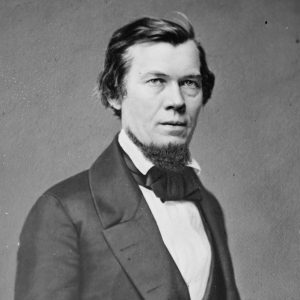
The “Hon. Jacob Thompson of Miss.” as photographed by Mathew Brady. Library of Congress Prints and Photographs Division. Brady-Handy Photograph Collection.
On November 6, 1848, the University of Mississippi held a celebration in honor of the opening of the college. Both Jacob Thompson, on behalf of the Board of Trustees, and George Frederick Holmes, President of the college, delivered addresses. At the time, Thompson served as a democratic congressman for Mississippi’s 1st District in the House of Representatives. Later, Thompson joined President James Buchanan’s cabinet as Secretary of the Interior. Earlier in his life, Thompson attended and worked at the University of North Carolina, another institution known for its strong pro-slavery identity.
In his address, Thompson outlined his vision for the new university. He explained the process in hiring faculty, and he declared that the university would serve all Mississippians. “To this altar,” asserted, “we invite worshippers from all classes and conditions in society.”1 Thompson’s claims notwithstanding, of course, the university only admitted white male elites at the time. Thompson subsequently moved into his assessment of the increasingly dire political situation in the United States:
Moreover there is a growing disposition manifest to us all, in different portions of the world and of the United States, to denounce and vilify our institutions which have come down to us from a remote ancestry. On the maintenance of these institutions in its integrity and full enjoyment, our prosperity, safety, and happiness depend. We can never look to expediency; necessity alone, is the ruling consideration, and it is of the last importance to us, that the hearts of our young men should be kept in the right place, and it is verily a sin against our children to send them into that circle of fanaticism, which surrounds our northern colleges.2
In the midst of sectional crisis, Thompson reflected the fears of many prominent Mississippians in the public sphere. They feared the rising tide of abolitionism in the North, and they believed that northern colleges indoctrinated young men with abolition propaganda. Thus, the trustees of the University of Mississippi established the college in opposition to northern colleges. Thompson believed that the university must educate Mississippi’s young men so that they may one day defend the institution of slavery itself.
Notes:
1 Jacob Thompson, Address, Delivered on Occasion of the Opening of the University of the State of Mississippi: In Behalf of the Board of Trustees, November 6, 1848 by Hon. Jacob Thompson, M.C. Inaugural Address, Delivered on the Occasion of the Opening of the University of the State of Mississippi, November 6, 1848 (Memphis: Franklin Book and Job Office, 1849), 5.
2 Ibid., 5-6.
By Andrew Marion | February 13, 2017